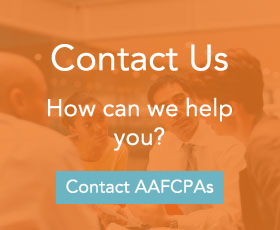Reduce Your Corporate or Partnership Income Tax for 2015
For every business, there is a lot at stake when it comes to tax. AAFCPAs wants you to take full advantage of all available tax benefits to assure you are optimizing your tax liability.
Below are a few examples of vehicles to consider that may work favorably for you, but your planning should begin now.
Advantages of a establishing a Profit Sharing Plan using a New Comparability Plan:
A New Comparability Profit Sharing plan allows you to target particular classes or groups of employees with a higher percentage of annual employer profit sharing contributions. The contribution amount is typically discretionary and determined on an annual basis.
- Business owners and other key personnel can receive a greater share of plan contributions.

- Highly compensated employees (HCE) can be rewarded more favorably, which can help in the retention of key employees.
- It can enhance an existing 401(k) plan in cases where employer contributions are already required (top heavy or safe harbor plans).
Advantages of a Defined Benefit Plan:
Defined Benefit plans favor those who are older. In many businesses, this is the business owner. For business owners who are older and have few and younger employees, a qualified plan can steer 85% or more of the plan contribution to the owner. This makes a qualified plan an excellent strategy for:
- Moving wealth from the business to personal assets
- Protecting assets from creditors
- Saving for a comfortable retirement
- Benefiting from current tax deductions
Any business entity may establish a qualified plan, including: Sole Proprietors, Partnerships, LLCs, Professional Corporations, and S-Corporations. Qualified plan contributions are 100% deductible.
These plan designs often work best when:
- Your company is profitable and may benefit from an immediate income tax deduction.
- Saving for retirement is a priority.
- You are an older owner and have younger employees.
- You have fewer than 10 employees.
- You have an existing plan that may be improved.
- You want to protect your assets from creditors.
Every tax situation is unique and requires a careful and comprehensive plan. AAFCPAs’ holistic approach to tax planning and compliance combines technical knowledge with proactive tax strategies.
If you have any questions about Profit Sharing Plans, Defined Benefit Plans or Top-Heavy plan challenges, please contact your AAFCPA partner, or Joel Aronson, CPA, PFS, at 774.512.4114, jaronson@nullaafcpa.com.

